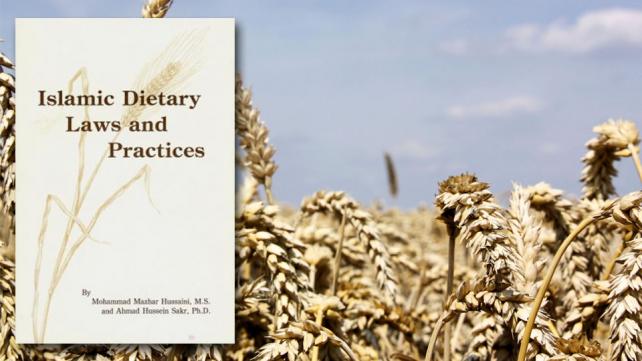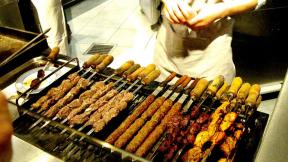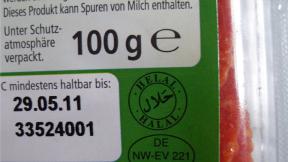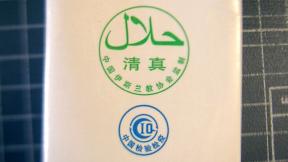
The lists of Halal and Haram food below have been taken with permission from the book 'Islamic Dietary Laws and Practices by Mohammad Mazhar Hussaini and M S Ahmad Hussein Sakr, Ph.D .
It should be noted that a product being imported from a Muslim country is not necessarily a guarantee that it is completely Halal. In fact, food is often imported from abroad into Muslim countries without proper checking of ingredients.
AN ALPHABETICAL DEFINITION GUIDE
An alphabetical list of Halal and Haram ingredients to look out for:
Bacon: A side of pig meat (pork).
Choletsorol: type of fat always of animal origin. If extracted from Zabiha animal, it is Halal.
Diglyceride: Emulsifier. If of animal origin it should be suspected till the source is known.
Gelatin (Jello Gelatin): Usually of animal origin, mostly from pig. If extracted from a dhabiha animal, then it is halal/
Glycerol (Glycerine): It could be of animal, plant or Glyceryl-Stearate synthetic origin. If animal source is used, it is suspected.
Hormones: Usually animal hormones are used for human consumption. One has to find out the source before passing a judgement.
Lard: Fat from swine particulaly found in the abdominal cavity. Totally Haram for us.
Magnesium Stearate (stearic acid): Used as an active ingredient in medicine tablets. Haram when derived from animal source.
Mono Glycerides: When derived from animal source. (Halal when the source is plant).
Pepsin: A digestive enzyme mostly from pig stomach.
Rennin (Rennet): A protein Enzyme. Usually not labeled. (In most cheeses).
Shortening: Fats and oils of animal origin. Animal/Lard
Vanilla: Extracted using alcohol.
Vitamins: Haram when from animal source. Mostly the source is synthetic or plant and are Halal.
Whey: Used in ice creams and yogurt. Haram when from animal source.
A PARTIAL LIST OF HALAL INGREDIENTS
S/N Name of Ingredients Code No Brief Description
Antioxidants: Chemical compounds used to protect certain food components from being destroyed or lost through oxidation.
Ascorbic acid: Vitamin C.
Benzoate (Benzoic acid): Benzoic acid and sodium benzoate are used for food preservation.
Biotin: A member of the B complex vitamins.
BHA: An antioxidant, preservative.
BHT: An antioxidant, preservative.
Citric acid: Sources are plant, usually of the citrus family. (e.g. orange, lime, lemon).
Cobalamine: Synthetically prepared Vitamin B12.
Dextrin: An emulsifying, sizing, and thickening agent.
Fiber: Sources are plant. Provide roughage to diet.
Fructose: Fruit sugar.
Gliadin (Gluten): Ptotein found in wheat and rye.
Hydrogenated oil: Vegetable oil being hydrogenated making it solid at room temperature.
Iodine: A nutrient for thyroid gland.
Lecithin: Emulsifier of fat. In the USA, sources are mainly soyabean and egg yolk.
Lipids : Essential fatty acids found in fish, plant and animals. If source is animal; it is suspected.
Malt: A kind of fermented grain.
Molasses: Syrup liquid obtained in refining sugar.
MSG: Flavoring. Imparts meat flavor to foods.
Niacin: One of the B complex vitamins.
PABA: A food supplement.
Pectin: A gelatinous substance extracted from fruits.
Propionic acid: A preservative.
Riboflavin: One of the B complex vitamins. Usually the source is synthetic.
Pure vegetable shortening: Source of this kind of shortening is plant.
100% vegetable shortening: Source of this kind of shortening is plant.
Sweetener: Substance that gives a sweet taste.
Thiamin: One of the B complex vitamins.
Vanillin: Flavoring agent, extracted from vanilla.
Vitamin A: If source are plant and synthetic, it is halal.
Vitamin C: Natural sources are from plant. (e.g. citrus fruit, tomatoes, etc).
Vitamin D: Natural sources are yeast and fish liver oil. Also synthetically produced.
Vitamin E: Rich sources of Vitamin E are vegetable oils. When source is synthetic, it is halal. If source is animal, it is suspected.
Water: The nutrient most vital to man's existence.
Food yeast: Microscopic, unicellular, fungal plant used for fermentation process and in baking bread.
Photo Attribution: "Weizen2" by Dako99 - Own work. Licensed under Creative Commons Attribution-Share Alike 3.0 via Wikimedia Commons - http://commons.wikimedia.org/wiki/File:Weizen2.jpg#mediaviewer/File:Weizen2.jpg








Comments
Asalam-o-Aliekom..Masahallah this site helped me alot in understanding the orgins of the many ingredients we find in foods today. All I request is that u answer the questions asked in the comments given. Inshallah it would be a great help to all of us and would lead us on a better path to choosing our foods. Jazakallah.Wa'salaam
Location
Assalam-o-Alykum the web site is very informative and I beleive muslims around the world can benefit from it. Recently I read about L-Cystine which is drawn from human hair it is used in pizza dough and bagel dough. I also recently learned that pizza hut dough carries L-Cystine and bagels from Dunkin Doughnuts also have L-Cystine in them. Can you please investigate regarding this matter because human hair is haram to use and not a lot of people are aware of it. May Allah bless you keep up the good work. Jazak Allah Khair
Location
It is very good site. We should care about general groceries and eating outside. May God bless all of us and give us guidness here and peacfull life hereafter.
Location
A-o-AIt is a very useful information indeed. It will be nice if you can add answers to all the comments/querries so that everyone can benefit from it. Thanks.
Location
Assalamo AlaikumGreat to see this site, it’s really helpful for Muslims finding Halal & Haram ingredients. Just one ambiguity, Haram list shows vanilla extracted from alcohol and off course is then Haram whereas vanillin when being extracted from vanilla is Halal as present in the Halal ingredient list.May Allah give you Jaza, keep it up.WassalamIshaq
Location
Assalamu-Alikum I am confused; the haram ingredients you have mentioned are widely used in food in the Western world. If a Muslim living in West takes the precautionary approach and eats nothing with any of these ingredients, I am afraid he may end up eating nothing off the shelf.I am not trying to be cynical but only trying to highlight a practical problem. Is it not better instead for someone, or some resourceful Muslim organisation to categorise individual products and/or companies that make food products as Being Halal or Haram? Some online database of some sort maybe that Muslims can then check. I am sure once the Muslim buying power in the Western countries comes behind such an effort, many food-processing companies themselves will be eager to get a ‘Halal’ certificate. This may in fact turn out to be a good profitable business!!!Just a thought….maqchaudry@hotmail.com
Location
I am not Islamic, but I appreciated finding your site. I only wish you had given a brief definition of Halal, etc. It would help me understand your explainations and your religion.
Location
Thanks for your interest.
Thanks for your interest. Halal means permissible. The opposite of halal is Haram which means impermissible. We are not allowed to have any pork, pork derived products, alcohol, or alcohol derived products. Also, if we wanted to eat meat the animal should be treated kindly and slaughtered in a manner that is quick and not visible to other animals; so other animals wont be scared. The animal should not suffer at all. Finally, the name of God shoild be mentioned when slaughtering the animal; this way it is halal to eat the meat and it's called Zabiha Halal meat. So we are for grass fed animals; also for cage free chicken. We are against treating animals badly. So, I almost turned into vegetarian when i moved to the west because of these conditions.
Also, there are other types of animals that God didn't design for us to eat so we don't eat them. I am not sure which animals exactly. But I think carnivorous animals like Lions, tigers... etc are not allowed. Also, dogs I thinkkkkkk are not allowed. Other than that we are free to eat all the gooness in this life ;)
Location
halal
I read your comment and it made me happy that people like you are searching about our religious. .. may Allah gives you a chance to turn into our religious.
Location
The information is very useful and good to know.
Location
Pages
Add new comment